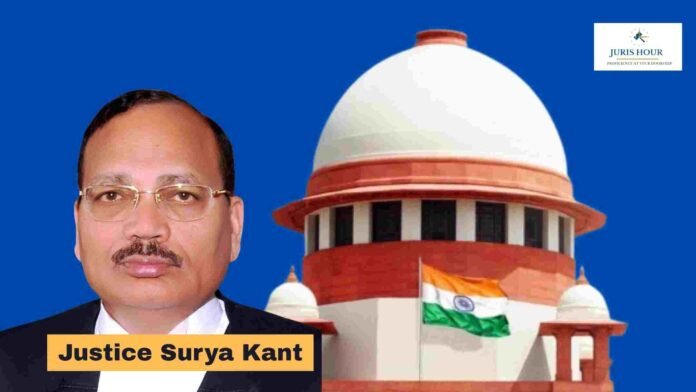Supreme Court Judge Justice Surya Kant on Thursday called upon the Indian judiciary to continuously evolve and innovate to address emerging societal challenges such as digital exclusion, displacement, climate vulnerability, and transnational migration. He warned that without adaptation, the justice system risks becoming “its own shadow.”
Delivering the inaugural BASL Human Rights Oration on the theme “Strengthening a Legal Aid System to Achieve Human Rights of Marginalised and Minorities: The Indian Case Study,” Justice Kant underscored the pivotal role of legal aid in sustaining India’s democratic conscience.
Describing justice as a “living promise,” he remarked, “The story of India’s legal-aid movement is, at its heart, the story of a democracy’s conscience. It proves that even in a vast and complex society, justice can be made real when vision is matched by institutional will.”
Legal Aid as the Soul of Democracy
Justice Kant observed that while India has made significant progress in expanding legal-aid infrastructure, evolving social realities demand fresh approaches and renewed institutional commitment. “Justice must evolve with society, or it risks becoming its shadow,” he cautioned, urging the judiciary and policymakers to modernise outreach and enhance inclusion so that legal protections reach the most marginalised first.
Citing tangible outcomes of India’s legal-aid system, he noted that every instance of a prisoner released through a legal-aid petition, a widow receiving her due pension, or a child being rehabilitated stands as a reaffirmation of constitutional values.
“Access to justice is not a privilege of the powerful, but a sacred duty of the State and society alike,” Justice Kant stated.
India’s Model: Inspiration, Not Imitation
Justice Kant emphasised that India’s experience with legal aid can serve as an inspiration—though not a template—for other nations, particularly in the Commonwealth. “Every country must design legal-aid systems grounded in its local realities but inspired by the belief that legal aid is the first line of defence against the erosion of human rights,” he said.
He cited landmark judgments such as Hussainara Khatoon v. State of Bihar, where the Supreme Court recognised free legal representation as a fundamental right under Article 21 of the Constitution. He described such rulings as milestones that transformed ideals into living realities, establishing legal aid as a cornerstone of India’s democratic framework.
Strengthening the Legal Aid Infrastructure
Justice Kant outlined the institutional mechanisms that sustain India’s vast legal-aid network through the National Legal Services Authority (NALSA), constituted under the Legal Services Authorities Act, 1987. The system now comprises 37 State Legal Services Authorities, 709 District Authorities, over 2,000 Taluka Committees, and more than 50,000 trained paralegal volunteers.
He further highlighted the crucial participation of young lawyers and law students through legal-aid clinics, paralegal training initiatives, and the Panel Lawyer System, which currently includes over 34,000 empanelled lawyers across the country.
“India’s youth have embraced legal aid not as charity, but as a responsibility,” he noted. “This inter-generational commitment ensures that the Constitution’s promise breathes anew every time a citizen’s rights are restored.”
Call for Continuous Innovation
Justice Kant concluded his address by reaffirming that legal aid is not merely an administrative mechanism but an ethical and constitutional necessity that protects human dignity and sustains freedom. He called for continuous innovation in legal-aid delivery and judicial practices to ensure that justice remains inclusive, accessible, and adaptive to societal change.
“Legal aid,” he said, “is not a gift—it is a guarantee that the democracy we cherish remains alive in the lives of the people it serves.”
Read More: Delhi Customs Seizes Suspected Ganja Worth Rs. 7.21 Crore at IGI Airport

